Environment
We published our pathway to net zero in September 2023. It summarises how we will drive down carbon emissions across our operations in the short, medium and long term as we strive towards our aspiration of net zero carbon before 2045.
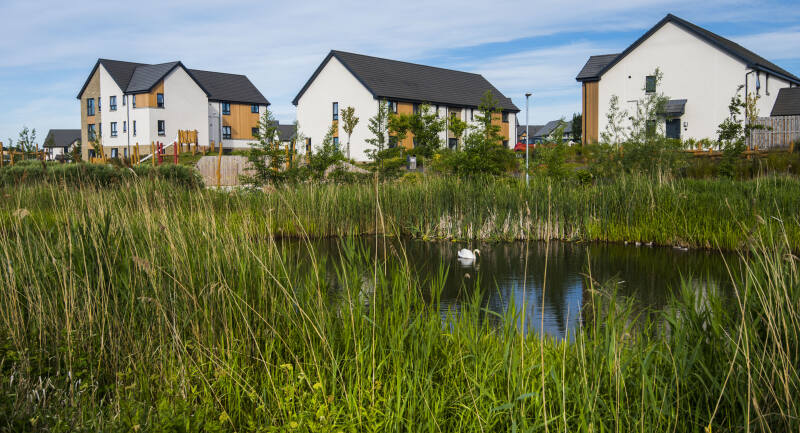
Fabric First for healthy, energy efficient homes
The Springfield approach to building a home is ‘fabric first’. We believe that opting for thick, quality insulation first and foremost is key to achieving energy efficiency and provides the most direct benefit to the customer, providing a comfortable temperature, reducing energy costs, and lowering impact on the environment.
We are proud to deliver exceptionally good quality and highly energy efficient homes for our customers across tenures. In the 2023/24 financial year, we have continued to acheive an average SAP rating of 86. SAP stands for Standard Assessment Procedure, and it is the methodology used by the government to assess and compare the energy and environmental performance of dwellings. A SAP of 86 is well in excess of what is required to achieve an Energy Performance Certificate rating of B. New research from the Home Builders Federation, based on EPC data, found that buyers of a new build house will save on average around £2,600 a year in energy bills and that new build homes emit a third of the carbon of an older property.
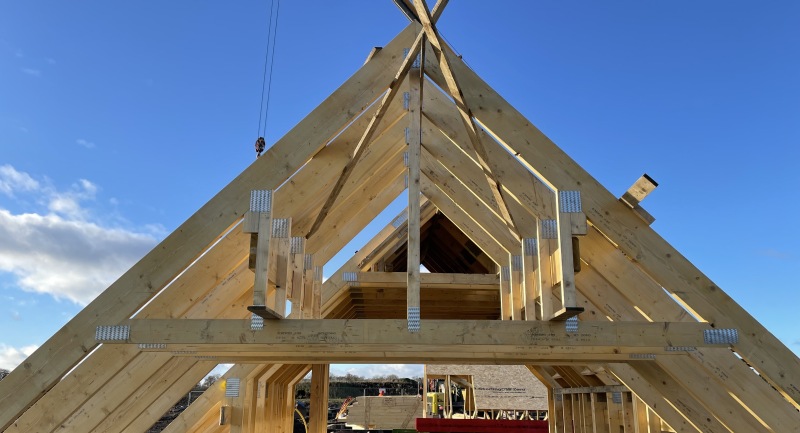
100% of Springfield houses are built using Forest Stewardship Council (FSC) or Programme for the Endorsement of Forest Certification (PEFC) approved timber with kits produced in Scotland. Springfield’s first timber kit factory opened over twenty years ago in Elgin in the north of Scotland. In 2022, we acquired a second timber kit factory in Glasgow. The addition of a second timber kit factory secures supply and further reduces our carbon footprint as we reduce the transport distances of the kits produced. Learn more about Springfield Timber Kit Systems.
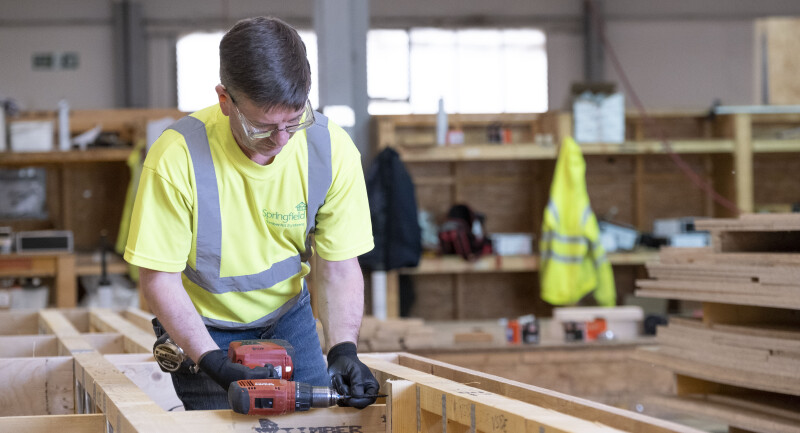
We use a durable quality, thermally efficient external fabric to retain heat within the home. Scottish Building Standards are amongst the highest in Europe and Springfield has gone beyond current regulations in our homes to ensure we are delivering the best for our customers now and into the future. For example, for daylight, sound insulation, ventilation, and inclusivity we build beyond regulatory standards.
A head start on air source technology
From later this year applications for building warrants will only be approved if new build homes are heated with an alternative to fossil fuel. With these plans in place we were keen to gain early experience and put in place supply chain partners for non-gas alternatives as soon as we could, and we opted for air source technology.
Air source heat pumps effectively do the opposite of a refrigerator, drawing warm air into the home from outside. By making the switch to heat pump technology, customers enjoy a warm home and save money, all while reducing their carbon emissions. The heat pumps that we fit operate almost silently, with a sleek, modern design making them the perfect fit for the quality homes we deliver.
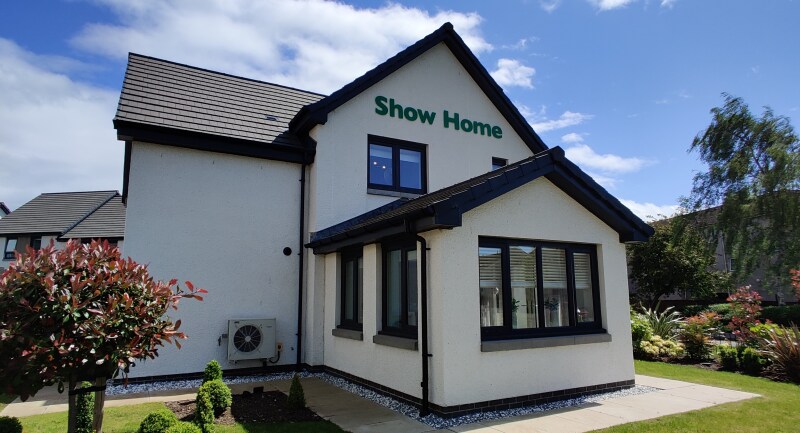
To date we have successfully delivered over 60 developments with homes heated by full air source. In the 2023/24 financial year, we delivered 45% of our homes without gas, an impressive increase from 32% in 2022/23.
We helpfully produced detailed instructional videos for our customers on the use of air source heating systems to ensure households can maximise the benefits from this technology.
Research and development in this space continues to be a priority for Springfield to ensure we are delivering the most efficient homes for our customers. Indeed, we recently undertook a project on alternative technologies to understand the impact of capital cost, running cost and carbon reduction of the life of the property. Our research confirmed that air-source technology remained the best option when delivering homes without gas.
Sustainable Communities
Each of our developments are designed to create sustainable communities which will remain attractive and popular for years to come. We use a registered architect and urban designer in each of our designs to add value for our customers and communities.
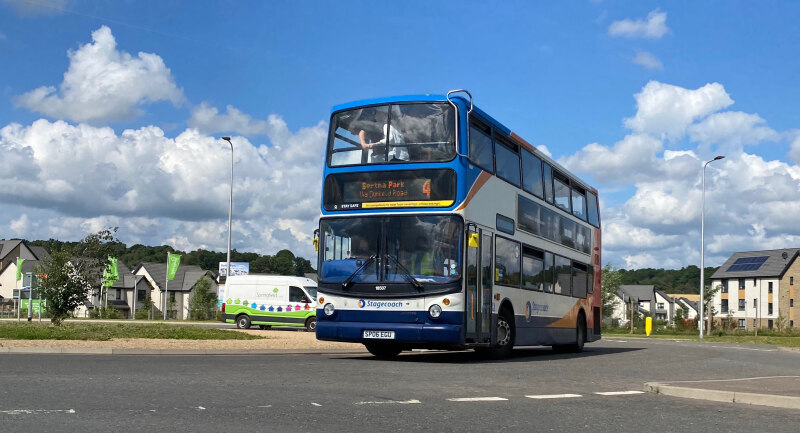
We support the aspiration for 20-minute neighbourhoods and each of our developments, even within our more rural areas, have a means of public transport within 400 metres to allow residents to access bus or rail travel locally. The generous provision of greenspace and landscaping within our developments is designed with community wellbeing and the promotion of biodiversity in mind. We are proud that many of our larger developments include facilities that help communities thrive including schools and shops. Our Village Developments at Bertha Park in Perth and Dykes of Gray in Dundee provide established examples of this.
We have received external recognition for the sustainability of our villages, with Bertha Park in Perth securing the gold title for Best Sustainable Development at the 2022 WhatHouse? Awards. Judges were impressed that Bertha Park homes feature cabling for electric car charging, sustainable heating systems and high levels of insulation. The wider village boasts an established loch, ancient woodland, and a biodiverse suds pond. Meanwhile, Dykes of Gray achieved the silver award for Best Public Realm. The village includes public art, green corridors, places for children to play and a community core complete with local businesses overlooking an amphitheatre.
Environmental Management System
Springfield has an ISO 14001 certified Environmental Management System which is externally audited and certified by a UKAS accredited organisation. Current reporting includes waste, carbon, prosecutions and fines, audit and inspection findings and trends. Planned and random audits are undertaken internally by our SHEQ team.
We also have an Environmental Policy in place which includes the protection and enhancement of biodiversity. We are pleased to confirm that we do not have any sites identified as areas of nutrient stress, and no environmental prosecutions in the past five years.
EV charging for our customers' homes
The Scottish Government pledged that by 2030, new petrol and diesel cars and vans would be phased out. With EV infrastructure still in its infancy at the time of the announcement, the lack of home charging was perceived as a barrier for making the switch. In January 2018, well ahead of regulations, to make it as easy as possible for customers to go electric we committed to including cabling for all Springfield houses with a driveway or garage for private sale.
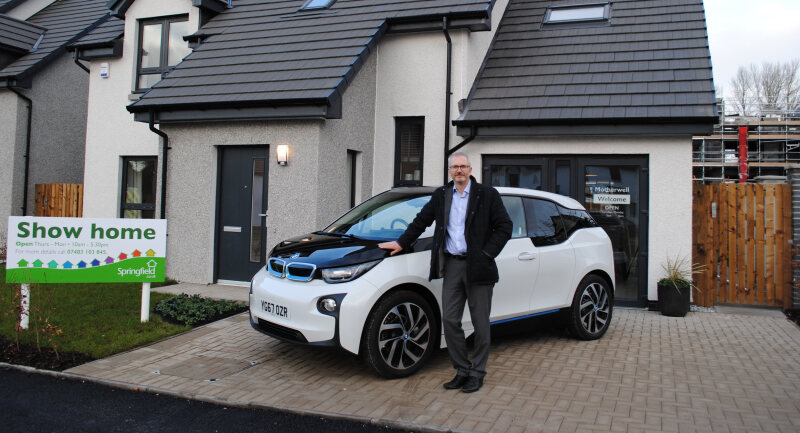
Installed to the most practical point of the home, typically the garage or the driveway, the 240v cabling makes the installation of a charging point less intrusive for the customer. We have already delivered over 3,000 homes with EV cabling.
Company electric vehicles
To reduce our impact on the environment and encourage a behavioural change, in September 2021, we launched a Company Electric Car scheme for eligible employees. Since the scheme was launched, we have been pleased with the take up with 134 electric cars already in use by employees.
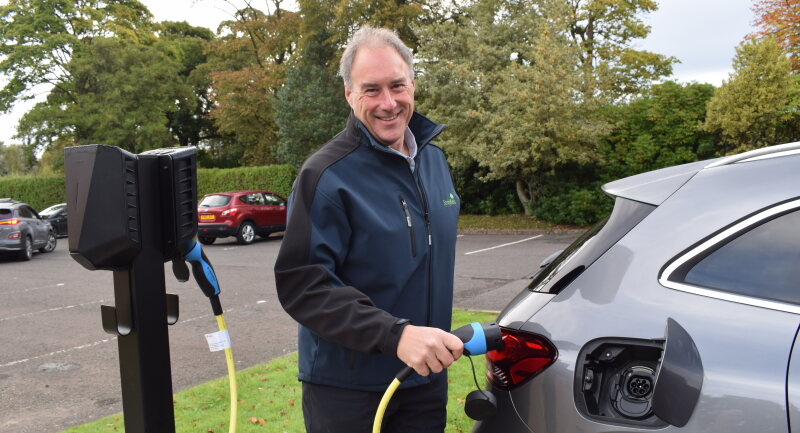
Adding to our support, in September 2021, we introduced our first electric van, which is used by staff at our off-site kit factory in Elgin. The use of electric vans is an important part of our sustainability strategy, and we are in the process of transitioning our fleet. With an estimated saving of 5.2 tonnes of carbon dioxide per vehicle, this initiative will drive a noticeable decrease in our carbon footprint across the company. We also introduced two fully electric Minibuses which offers workers sustainable travel to the out-of-town kit factory.
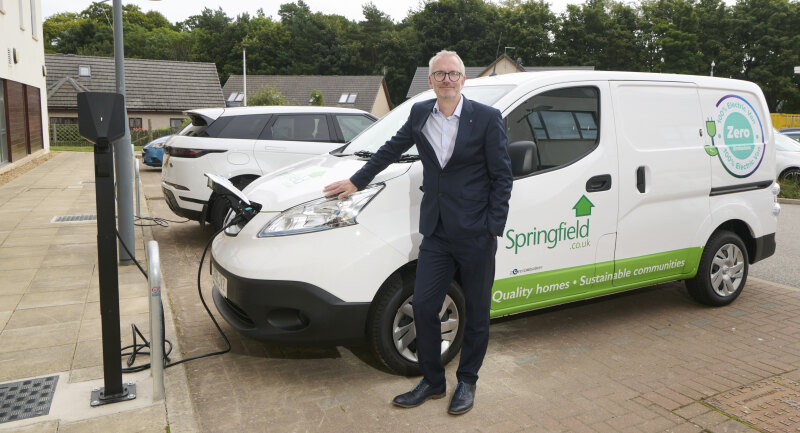
Waste
We have recently reviewed our waste data collection in tracking waste across the Springfield Group. Our data methodology exceeds industry standards because we include all waste - construction, demolition and excavation waste. In 2023/24 we calculate that we diverted 88.3% waste from landfill.